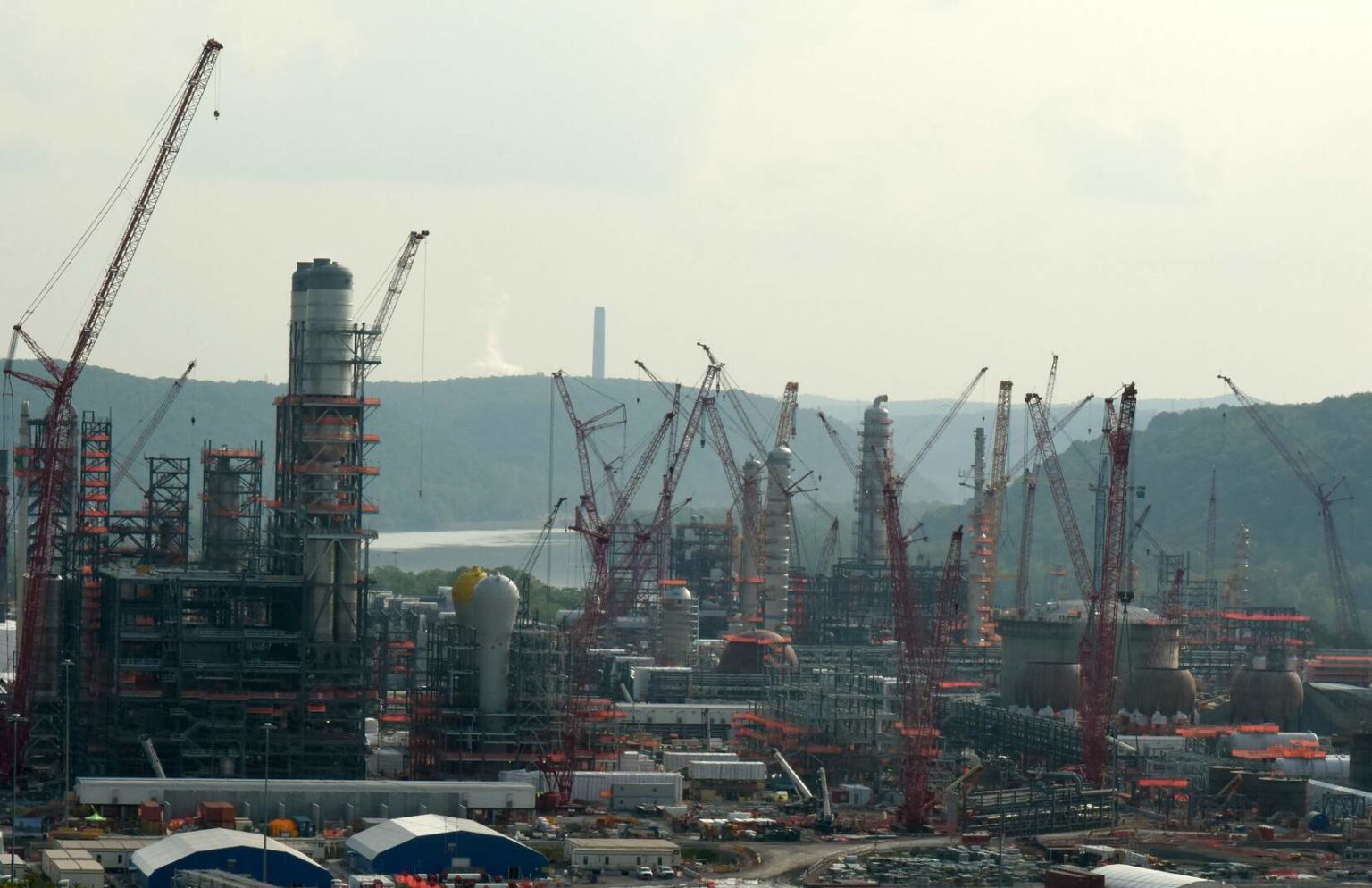Citing design changes, Shell Chemical Appalachia has asked Pennsylvania’s state regulators to issue air permits that would allow the company’s massive plastics manufacturing plant under construction outside Pittsburgh to emit significantly more climate and other air pollution.
Yesterday, as most of the nation turned its focus to the presidential election, a coalition of environmental and community organizations wrote to Pennsylvania’s environmental regulators, asking them to either reject those permits or allow more time for public review of the proposed changes, which were disclosed in state filings in early October.
Granting the permits would cause significant hikes in the air pollution coming from Shell’s Beaver County plastics manufacturing equipment — the biggest petrochemical construction project in Appalachia.
And, because of the COVID-19 pandemic, the groups say that they need more time to review Shell’s proposed changes, which could have significant public health implications. “The DEP is hard to reach as they are all apparently working from home,” Debra Smit, director of communications for the Breathe Project, said November 2, referring to the Pennsylvania Department of Environmental Protection. “We had no choice but to voice opposition to these permit today, the deadline for comments.”
If approved, the permits would allow Shell’s plastics manufacturing plant to emit an additional 4.7 tons of fine particulate matter, 4.9 tons of particulate matter, and over 55,000 tons of greenhouse gas emissions each year, the groups said, adding that Shell’s proposed modifications would also somewhat reduce the plant’s emissions of volatile organic compounds, carbon monoxide, and nitrogen oxides.
Fine particulate matter, sometimes called PM2.5, is so extraordinarily tiny that you could line up three dozen PM2.5 particles across a single grain of sand. Generally too small to be seen, this type of air pollution, which comes from vehicle tailpipes, factory smokestacks, and wildfires, can wreak havoc with people’s lungs — a particular concern during the COVID-19 pandemic.
“[Particulate matter] is responsible for more deaths and sickness than any other air pollutant in the world,” Gretchen Goldman, a research director at the Union of Concerned Scientists, told ProPublica this month.
There are already over 16,000 people with asthma, 10,000 people with COPD (a chronic inflammatory lung disease), and 105 people with lung cancer living in Beaver County, where the sprawling plastics facility is being built, the letter notes, out of a total population of roughly 164,000 residents.
“The American Lung Association assigns Beaver County a grade of ‘F’ for Ozone, even before this plant has come online,” the Beaver County Marcellus Awareness Community, a local community group wrote in comments to the Pennsylvania Department of Environmental Protection (DEP). “Adding more to this pollution will only worsen health problems for Beaver County residents.”
Seventy-two workers at Shell’s plant have tested positive for COVID-19 since construction began, the Times Online, a local news service, reported on October 30, including 14 workers then-positive for the virus. Shell had temporarily paused construction this spring over virus concerns.
This story is part of Fracking for Plastics, a DeSmog investigation into the proposed petrochemical build-out in the Ohio River Valley and the major players involved, along with the environmental, health, and socio-economic implications.
The permits relate to design modifications for the massive $6 billion plant, including changes that would add more electrical generation equipment on site, according to an application Shell filed with the state roughly one month ago.
“These pollution levels will seriously impact the air that residents of our region will breathe,” said Robert Schmetzer, co-chair of the Beaver County Marcellus Awareness Community, which filed comments opposing the permits.
Increases in greenhouse gas emissions associated with the proposed design changes would also be significant, organizers say.
Shell’s Beaver County project already has permits allowing it to send roughly 2.2 million tons of carbon dioxide into the atmosphere each year.
The additional 55,000 tons involved in this request might be a relatively small percentage of those emissions — but it would require the planting of over 830,000 trees each year that the plant operates to offset the increased greenhouse gas emissions if regulators approve the permits, the Beaver County Marcellus Awareness Community said.
Put another way, the annual emissions increase if state regulators grants the new permits would equal the climate pollution from driving over 10,000 additional cars for a year, on top of what the plant is already approved to pollute.
In its state filing, Shell characterized the proposed changes as routine. “‘As-built’ changes in design and construction are common in large scale construction projects such as the Shell facility,” Shell wrote in a state filing. “The changes proposed in this plan approval include minor equipment additions, removal and downsizing of equipment permitted, and increases and decreases in the unit capacities of some equipment.”
The groups also say they’re seeking clarity about how the permits might affect when Shell is required to report emissions data to the state.
“The updates also highlight the definitions of what constitute ‘startup’ and ‘shutdown’ conditions,” the groups wrote. “The community needs to be alerted to these new definitions, as they determine when Shell is obligated to share emissions information with the community through its active and passive monitoring equipment” and other requirements.
A spokesperson for Shell did not immediately reply to a request for comment sent by DeSmog.
Main image: Construction of Shell’s $6 billion plastics manufacturing complex, on the banks of the Ohio River in Beaver County, Pennsylvania, underway in 2019. Credit: Laura Evangelisto © 2019Subscribe to our newsletter
Stay up to date with DeSmog news and alerts








